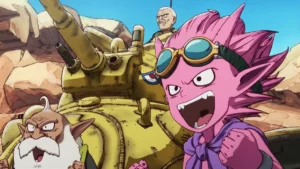Masters of the Universe: Revolution 2024 Tv Series Review and Trailer

In contrast to its split-season predecessor, Revelation, Masters of the Universe: Revolution opts for a consolidated five-episode run. This choice introduces a pacing challenge, as the narrative attempts to propel Masters of the Universe continuity forward while juggling various plotlines involving He-Man, Teela, and the introduction of the space-fascist villain Hordak. Despite its effort, the limited episode count leaves little room for the story to breathe, with resolutions feeling somewhat rushed.
The first episode unveils a twist, suggesting that a crucial aspect of MOTU lore remains unknown to major characters. This twist serves to surprise fans, challenging their assumptions while incorporating references to various franchise variations. The inclusion of Gwildor from the 1987 movie allows for meta-jokes about character similarities. Executive producer Ted Biaselli’s impersonation of Billy Barty adds a nostalgic touch, although it occasionally leans on familiar movie lines. William Shatner’s undisclosed role adds intrigue, hinting at significance rather than a mere cameo.
Keith David’s casting as Skeletor’s old boss Hordak is spot-on, but the script dilutes his menace with excessive chattiness. The choice to make him more talkative aligns with his dictator character but might slightly diminish the expected level of evil. The animation successfully retains the charm of ’80s TV animation, with CGI used to enhance fantasy and sci-fi elements.
The aftermath of Revelation leaves Eternia without a Preternia, leading Teela to embark on a mission to rebuild Heaven. Meanwhile, King Randor’s deteriorating health forces He-Man to make a life-altering choice. The narrative introduces religious allegorical themes and explores opposite-sex attraction between He-Man and Teela. Hordak’s inclusion heightens the conflict between technology and magic, while Mark Hamill’s portrayal of Skeletor impressively evolves.
The condensed runtime, equivalent to a long movie, doesn’t allow for the establishment of stakes, making it challenging to fully engage with the story’s twists and turns. The planet-wide invasion of Eternia by space Nazis feels rushed, leaving some characters seemingly overpowered by the end. Despite its focus on action beats and fan service, Revolution sets the stage for potential spin-offs and sequels, though their realization remains uncertain.
While Revolution aims to correct perceived deviations from canon, its heavy reliance on fan service may leave some wishing for more exploration of the world beyond the royal palace, Castle Grayskull, and Snake Mountain. The desire for breathing room and a broader cosmic canvas for the most powerful man in the universe lingers, highlighting the need for a more expansive exploration of the Masters of the Universe world.




